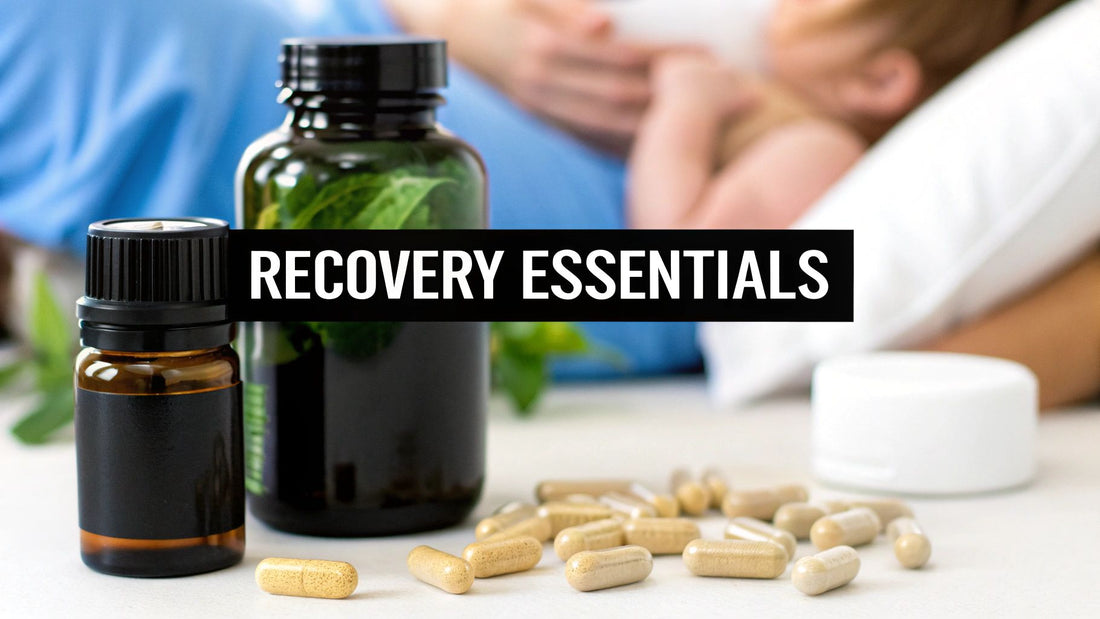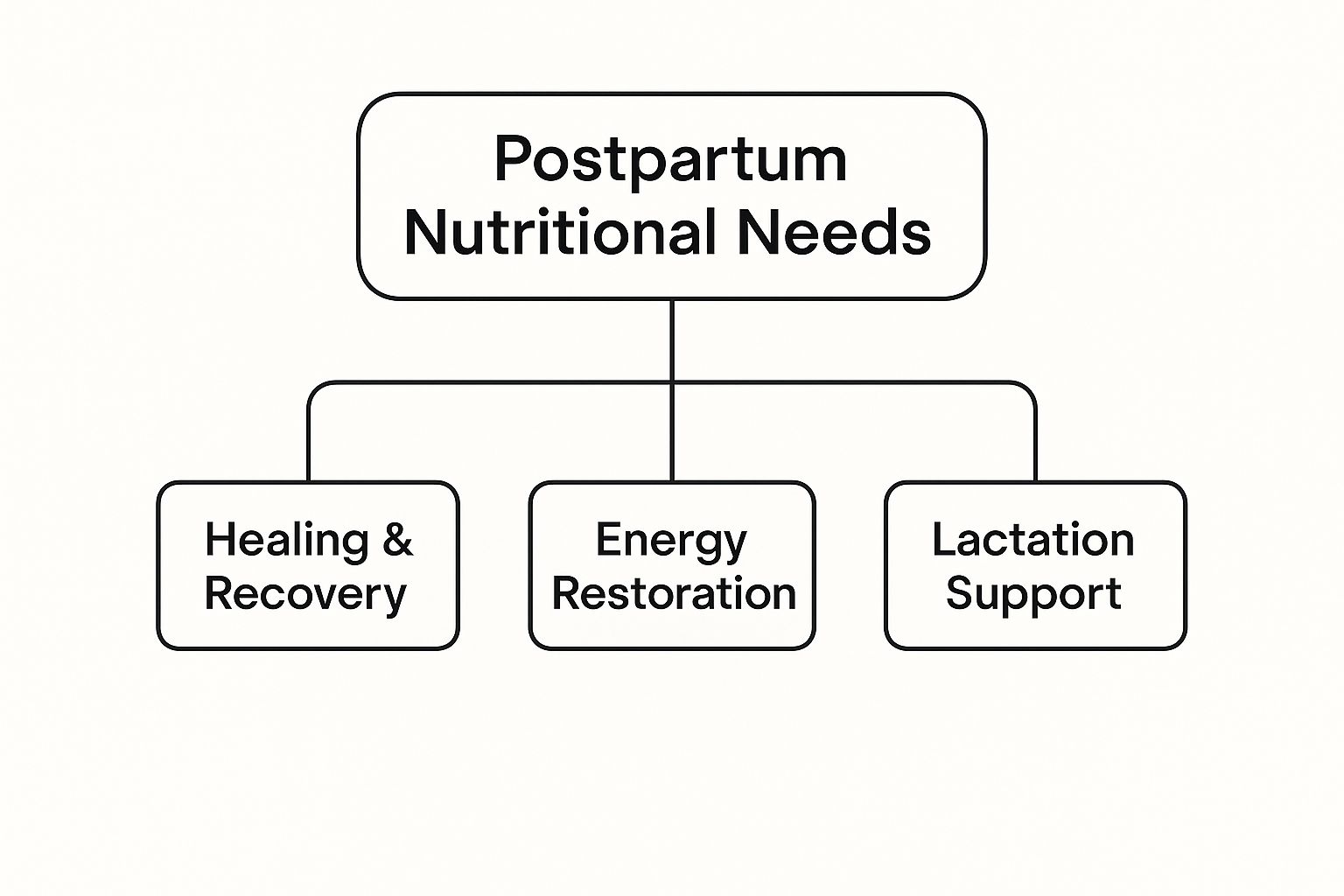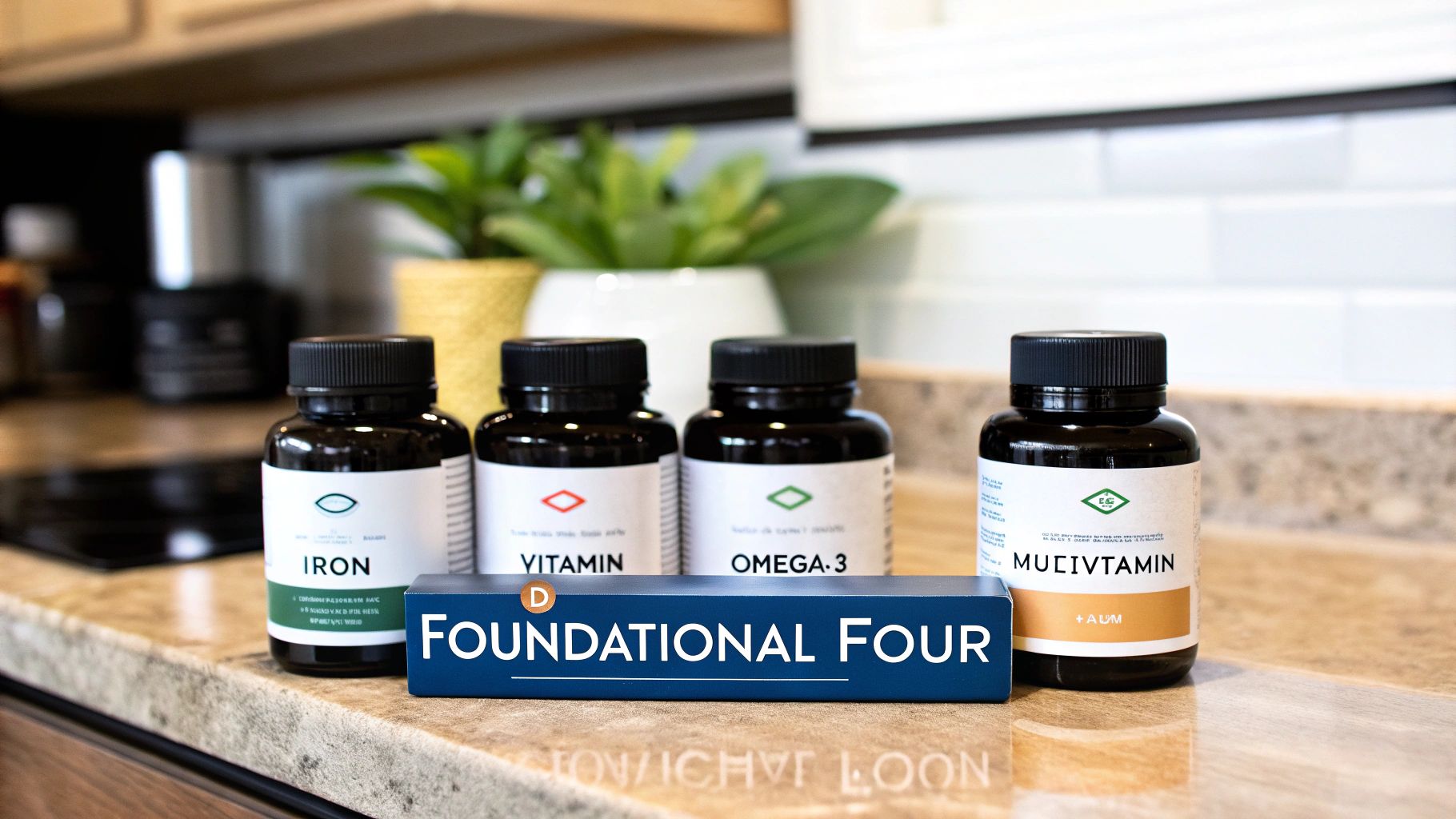
Top Supplements for Postpartum Recovery | Best Supplements for Postpartum
Share
When it comes to the best supplements for postpartum, the goal is simple: refill your tank. Pregnancy and childbirth take a massive toll, and the foundational four—a high-quality postnatal multivitamin, iron, vitamin D, and omega-3s (DHA)—are non-negotiable.
These nutrients are your front line for boosting energy, supporting your mood, and kickstarting physical recovery. It’s all about giving your body targeted support during the demanding fourth trimester.
Your Guide to Postpartum Nutritional Support
Giving birth is one of the most physically draining things a human body can go through. After nine months of sharing your resources with a growing baby, your own nutrient stores are often scraped clean. This is where "postpartum depletion" comes in—a state that can leave you feeling exhausted, foggy, and emotionally fragile if you don't address it.
Let's be real: a perfectly balanced diet is the dream, but new motherhood often makes that impossible. Between sleepless nights and a baby who needs you 24/7, there's rarely time or energy for gourmet meal prep. That's where targeted supplements become your nutritional safety net, filling in the gaps your diet can't.
The Three Pillars of Postpartum Recovery
Think of your recovery like a building held up by three core pillars. Each one needs specific nutritional building blocks to stay strong so your body can heal while you take care of your baby. This framework shows how everything works together for a full recovery.

This visual breaks down postpartum nutrition into healing, energy, and lactation, showing just how interconnected these areas are for a new mom's well-being.
The world is finally catching on. The global market for postpartum health supplements, currently valued at around USD 1.35 billion, is expected to skyrocket to nearly USD 2.93 billion by 2033. This isn't just a trend; it's a collective shift toward prioritizing maternal health after birth. You can dig into the data on the postpartum supplement market to see how attitudes are changing.
Fun fact: your nutritional needs are actually higher during the postpartum period than they were during pregnancy, especially if you're breastfeeding. A dedicated postnatal supplement is designed to meet these intense new demands head-on.
Postpartum Recovery Goals and Key Nutrients
To make this crystal clear, here’s a quick breakdown of common postpartum goals and the nutrients that help you get there. Think of this as your cheat sheet for understanding what your body is asking for.
| Recovery Goal | Common Challenges | Example Supporting Nutrients |
|---|---|---|
| Physical Healing | Tissue repair, wound healing, blood loss | Iron, Vitamin C, Zinc, Collagen |
| Energy & Mood | Fatigue, "baby blues," brain fog | B-Vitamins, Vitamin D, Magnesium |
| Lactation Support | Low milk supply, nutrient-rich milk | Choline, Omega-3s (DHA), Fenugreek |
| Bone Health | Depleted calcium stores | Vitamin D, Calcium, Magnesium, Vitamin K2 |
This table shows that it’s not just about one magic ingredient, but a team of nutrients working together to help you feel like yourself again.
Why Your Prenatal Is Not Enough
So many new moms ask if they can just keep taking their prenatal vitamins. And while a prenatal is way better than nothing, it’s not designed for the unique demands of the fourth trimester. Postnatal formulas are specifically jacked up with higher levels of key nutrients to fuel your recovery and support lactation.
- Increased Iron: You lose a lot of blood during delivery. Extra iron helps rebuild those stores and fight off that deep, bone-weary fatigue.
- More B Vitamins: These are your energy factories, turning food into fuel. Every new mom needs more of that.
- Higher Vitamin D: This powerhouse supports your mood, immune system, and bone health—for both you and your baby through breast milk.
- Essential Omega-3s: DHA is absolutely critical for your baby's brain development and can be a huge help for your own mental well-being.
At the end of the day, finding the best supplements for postpartum isn’t about a quick fix. It’s about arming your body with the right tools to heal, replenish, and actually thrive in this incredible new chapter.
The Foundational Four Postpartum Supplements

While every new mom's story is different, the biology of recovery is pretty universal. Your body is working overtime—healing tissues, sorting out hormones, and maybe even making milk. This isn't a small job, and it demands the right set of tools. A few key supplements are the absolute non-negotiables for this massive task.
Think of it like building a house. You don't start with the paint color; you start with a solid foundation. These four supplements are that concrete slab—the structural support your body is screaming for. Getting these right is the first, most critical step in your recovery.
Iron: Rebuilding Your Energy Stores
Childbirth involves significant blood loss—that's just a fact. And with that blood loss goes a huge chunk of your body's iron stores. Iron is what makes hemoglobin, the protein that zips oxygen from your lungs to every other part of your body. Your brain, your muscles, everything needs it.
When your iron is low, your body is stuck in low-power mode. This is why postpartum anemia is so common, and why so many new moms feel a level of fatigue that goes way beyond just being tired. It’s a physiological drain that needs to be fixed.
A good iron supplement helps you refill those empty tanks, rebuilding your body’s entire energy grid. More oxygen gets to your cells, which directly fights that bone-deep exhaustion and helps you feel more like yourself again.
Vitamin D: The Sunshine Vitamin for Mood and Immunity
Vitamin D isn't just a vitamin; it acts more like a hormone, playing a role in hundreds of bodily processes from your immune system to bone health. For postpartum moms, its link to mood regulation is huge. Studies have clearly connected low Vitamin D levels with a much higher risk of postpartum mood issues.
It’s like the conductor for your brain’s mood orchestra. When you have enough, it helps keep your neurotransmitters in sync. When you're low, things can get out of tune, fast.
Key Takeaway: If you're breastfeeding, your Vitamin D status is your baby's Vitamin D status. Your baby is completely dependent on your milk for this nutrient, making your supplementation essential for their bone development and immune health.
On top of that, Vitamin D is what allows your body to actually absorb calcium—critical for rebuilding your own bone density while also supplying enough for your baby.
Omega-3s (DHA): Brain Fuel for Both of You
Omega-3s, especially DHA, are the literal building blocks of the brain. During the third trimester, your baby's brain goes through an explosive growth spurt, and it pulls DHA directly from your stores. That doesn't stop after birth—the transfer just continues through your breast milk.
Taking a DHA supplement postpartum does two key things:
- For your baby: It supplies the essential fats they need for ongoing brain, vision, and nervous system development. You’re literally sending over the raw materials for their brain construction.
- For you: It starts to refill your own depleted tank, which is strongly linked to a lower risk of postpartum depression. It also helps fight off that "mom brain" fog and supports your emotional stability.
Skipping Omega-3s is like trying to build a supercomputer with half the parts missing. You both need a steady supply to function at your best.
Postnatal Multivitamin: Your All-in-One Insurance Policy
Finally, the postnatal multivitamin. This is the cornerstone that holds everything else together. A prenatal is great, but a postnatal is specifically formulated for the insane demands of recovery and lactation. It’s not a generic multi—it's a targeted formula for this exact phase of life.
Here’s how a top-tier postnatal stands apart from a prenatal:
- Higher B-Vitamins: It’s packed with more vitamins like B6 and B12, which are essential for turning food into energy and kicking fatigue to the curb.
- More Vitamin D: Like we said, your needs (and your baby's) go up after birth, and a postnatal formula accounts for that.
- Targeted Minerals: It usually has more zinc to help with wound healing and immune support, plus iodine for your thyroid, which can get thrown out of whack after pregnancy.
- Brain-Boosting Choline: This is another nutrient vital for your baby’s brain development (via breast milk) and for helping your own cognitive function bounce back.
A dedicated postnatal multivitamin is your nutritional safety net. It makes sure that even on the days you’re living on granola bars and coffee, your body is getting the core nutrients it needs to heal, make milk, and keep you going.
Targeted Supplements for Specific Postpartum Needs

Once you’ve got your foundational four supplements locked in, you can start getting more specific. Think of this as building your personalized recovery toolkit. While the basics cover your core nutritional bases, these next supplements are the problem-solvers for the unique hurdles you might be facing.
This is where you get to listen to your body and give it exactly what it’s asking for. Whether it’s restless nights, aching muscles, weird skin changes, or digestive issues, there’s a targeted nutrient ready to step in.
Soothe Muscles and Support Sleep with Magnesium
Struggling with restless legs at night? Stubborn muscle cramps? A brain that just won’t shut off? You might be low on magnesium. This mineral is a powerhouse, involved in over 300 reactions in the body and acting like a master switch for your entire nervous system.
The stress of childbirth and early motherhood burns through your magnesium stores fast. When your levels get low, your nervous system can get stuck in the “on” position. This leads to muscle tension, anxiety, and terrible sleep—right when you need restorative rest the most.
Supplementing with a form like magnesium glycinate, which is easy for your body to absorb, can be a total game-changer. It helps relax tight muscles and brings a sense of calm, making it easier to fall asleep (and stay asleep) during those precious quiet moments.
Rebuild and Repair with Collagen
Pregnancy and childbirth put incredible strain on your body’s connective tissues—from your skin stretching to your pelvic floor muscles working overtime. Collagen is the main protein that gives these tissues their structure and stretch. It’s basically the glue holding everything together.
But after delivery, your body’s natural collagen production can’t always keep up with the demand for repairs. Adding a collagen peptide supplement gives your body the raw materials it needs to get the job done.
This can help:
- Improve skin elasticity as everything shifts back.
- Strengthen hair and nails, which often get brittle postpartum.
- Support your joints and ease the aches that come with carrying and feeding a newborn.
- Help heal abdominal tissues and C-section scars.
Think of collagen as the scaffolding for your body’s repair crew. Giving them a steady supply of materials ensures they can rebuild everything from your skin to your joints, making your recovery feel a lot smoother.
Adapt to Stress with Ashwagandha
The fourth trimester is a time of huge change. It’s joyful, but it’s also incredibly stressful. Ashwagandha is an adaptogenic herb that helps your body manage that stress by keeping your cortisol (the stress hormone) in check. When you're constantly stressed, cortisol stays high, leading to exhaustion, mood swings, and a weaker immune system.
Ashwagandha works by balancing your body’s stress response, helping you feel calm and resilient without making you drowsy. It’s a powerful tool for navigating the emotional rollercoaster of new motherhood, making the daily challenges feel a little less overwhelming. Just be sure to talk to your doctor before taking any herb, especially if you’re breastfeeding.
Balance Your Gut with Probiotics
The link between your gut and your brain is no joke. The postpartum period can throw your gut microbiome out of whack thanks to hormonal shifts, stress, and any antibiotics you might have had during delivery. When your gut bacteria are imbalanced, you can end up with bloating, constipation, and it can even affect your mood.
A good probiotic supplement helps bring back the good bacteria, restoring balance to your digestive system. This not only helps with digestion but also supports your immune system and can give your mental well-being a boost. A happy gut really does help with a happier, more comfortable postpartum experience.
And if you’re focused on rebuilding your strength, you might also be interested in our guide on the best creatine for glute growth, which explains how certain supplements can support very specific fitness goals.
How to Choose Safe and Effective Postpartum Supplements
Navigating the supplement world feels like a full-time job, especially when you’re already juggling a newborn. With flashy labels and confusing claims, how do you know what actually works and what’s just marketing hype?
Here’s your guide to cutting through the noise.
Think of it like this: you wouldn't just grab the shiniest apple at the farmer's market without checking for bruises. You’d want to know where it came from. The same goes for supplements. The best ones are transparent, pure, and made with ingredients your body can actually use.
Decode the Supplement Label
The back of the bottle tells you everything—if you know what you're looking for. Learning to read a label is your first line of defense against wasting money on junk.
Here’s what to check:
- Active Ingredients and Dosages: Look for specific amounts of each nutrient. Vague “proprietary blends” are a huge red flag. They’re a sneaky way for companies to hide how little of the good stuff is actually in there.
- Ingredient Forms: Not all forms are created equal. For example, magnesium glycinate is easy on your stomach and highly absorbable. But magnesium oxide is cheap, poorly absorbed, and mostly just works like a laxative.
- "Other Ingredients" List: This is where companies hide fillers, binders, and artificial junk. A shorter list is almost always better. Keep an eye out for artificial colors, titanium dioxide, and pointless sugars.
This is more important than ever. With more moms buying supplements online, the options have exploded. The global postpartum health supplements market is expected to hit around USD 5.5 billion by 2025 because of it. You can read more about these market trends on Archive Market Research.
Look for Third-Party Certifications
The supplement industry isn't regulated like prescription drugs, so third-party certifications are your best friend. These independent groups test products to make sure what’s on the label is actually in the bottle—and that it’s free from harmful junk.
Think of a third-party seal as a stamp of approval. It’s an unbiased check that verifies a product’s purity and potency, giving you peace of mind.
Look for logos from trusted certifiers like:
- NSF International
- U.S. Pharmacopeia (USP)
- Informed Choice
Choose the Right Format for You
Postpartum supplements come in all shapes and sizes. The best one is the one you’ll actually take every day.
- Capsules and Softgels: These are easy, tasteless, and give you a precise dose. Perfect for busy moms.
- Powders: Powders are often more potent and absorb faster. They’re great for mixing into smoothies or water, especially for things like collagen or even creatine. Our guide on if women can take creatine breaks down how powders can help you get your strength back.
- Liquids and Gummies: These can work if you hate swallowing pills, but watch out for the sugar. Some gummies are basically just candy.
Ultimately, choosing the right supplements comes down to being a smart shopper. By learning to read labels, looking for proof of quality, and picking a format that fits your life, you can build a routine that actually supports your healing journey.
Creating a Simple Supplement Routine You Can Stick With

Knowing which supplements to take is one thing. Actually remembering to take them in the beautiful chaos of newborn life? That’s a whole different challenge.
Let's be real: the best supplements are the ones you actually take. The goal isn't perfection—it's building a simple, sustainable routine that becomes second nature.
One of the easiest ways to do this is with habit stacking. All this means is pairing your new habit (taking supplements) with something you already do without thinking.
For example, put your supplement bottle right next to your coffee maker or the water bottle you fill every single morning. That little visual cue links the two actions together, making it so much harder to forget. Before you know it, your brain will automatically connect "morning coffee" with "take supplements."
Timing and Pairing for Maximum Absorption
Beyond just remembering your supplements, how you take them really matters. Some nutrients are best friends and help each other work better, while others are rivals that compete for attention in your system. Nailing these simple pairings can make a huge difference in the benefits you feel.
The classic example is the power couple of iron and Vitamin C. Taking your iron supplement with a small glass of OJ or with your postnatal vitamin (which should already have Vitamin C) can seriously boost its absorption. Think of Vitamin C as a guide that helps iron get exactly where it needs to go.
On the flip side, some nutrients need their space.
- Iron vs. Calcium: These two minerals fight for the same absorption pathways in your gut. If you take them together, you won't get the full dose of either. It's best to take your iron supplement at least two hours apart from any calcium supplements or dairy-heavy meals.
Key Insight: Picture your gut as a one-lane road. If you send two competing nutrients down it at the same time, you create a traffic jam. Neither one gets to its destination efficiently. Spacing them out is like giving them each a clear path.
Should I Take Supplements with Food?
This is a great question, and the answer completely depends on the supplement. Following the right protocol can save you from an upset stomach and make sure you're getting every bit of good stuff from your pills.
Take with Food:
- Iron: Can be really harsh on an empty stomach. Taking it with a small meal or snack helps prevent nausea.
- Postnatal Multivitamins: The fat-soluble vitamins inside (A, D, E, and K) need a little dietary fat to be absorbed properly.
- Omega-3s: Best taken with a meal that contains fat to help absorption and keep those "fishy burps" away.
Can Be Taken on an Empty Stomach:
- Magnesium Glycinate: This form is known for being super gentle on the stomach.
- Collagen: Dissolves easily and can be taken pretty much anytime that works for you.
And as you start getting back into a fitness routine to rebuild your body, understanding this timing becomes even more important. You can find similar tips in our guide to the best pre-workout for women beginners, which covers how to time things for the best results.
By creating a simple, smart routine, you make your supplements work for you, not the other way around.
Common Questions About Postpartum Supplements
Trying to figure out postpartum supplements can feel like a full-time job. With so much conflicting info out there, it's easy to get overwhelmed. Let's cut through the noise and get you clear, straightforward answers to the questions every new mom asks.
We'll cover the real-world stuff that comes up when you're trying to heal, from whether your prenatal is "good enough" to how long you actually need this extra support.
Can I Just Keep Taking My Prenatal Vitamin?
This is probably the #1 question we hear, and it makes total sense. You’ve got a half-full bottle sitting there, so why switch? While sticking with your prenatal is a thousand times better than taking nothing, it's not actually what your body needs now.
Think of it this way: a prenatal is designed to build a baby. A postnatal is designed to rebuild you after the marathon of pregnancy and birth. Your nutritional needs don't just stay the same—they completely shift gears after you deliver.
A dedicated postnatal formula gives you more of what your body is screaming for right now:
- More Iron: To replenish what you lost during delivery. This is a game-changer for fighting that bone-deep postpartum fatigue.
- Higher B-Vitamin Levels: These are your energy powerhouses, helping turn food into fuel. Every new mom needs more of that.
- Increased Vitamin D: Crucial for supporting your mood, your immune system, and making sure your baby gets enough through your breast milk.
- Key Nutrients for Lactation: Ingredients like choline are often boosted to support your baby's brain development through your milk.
Making the switch ensures you're getting targeted help for healing, hormone balance, and milk production—not just leftover pregnancy support.
How Long Should I Take Postpartum Supplements?
There’s no single magic timeline here, because every mom's recovery is different. But a solid rule of thumb is to keep taking a comprehensive postnatal multivitamin for at least the first six months postpartum. That’s when your body is in the most intense phase of healing and rebuilding its nutrient stores.
If you’re breastfeeding, the game changes a bit. It’s best to keep taking your postnatal for as long as you're nursing. Your body is smart—it will always prioritize putting nutrients into your milk, even if it means taking them from your own bones and tissues. Supplementing makes sure there's enough to go around for both of you.
Important Takeaway: For specific nutrients like iron, don't guess. Your timeline should be set by your doctor. They can run blood work to see exactly where your levels are and tell you when it’s safe to stop, making sure your recovery is based on your real needs.
Ultimately, the best plan comes from listening to your body and checking in with a professional.
Are Herbal Supplements Safe While Breastfeeding?
This is where you need to be extremely careful and have a conversation with your doctor or lactation consultant. Yes, herbs like fenugreek have been used for centuries to boost milk supply, but the modern scientific evidence on safety and effectiveness is often murky.
The big concern is that whatever you take can pass through your breast milk to your baby. We don't have a lot of clear research on how these herbal compounds affect infants because, for obvious ethical reasons, those studies just aren't done.
Before you take any herbal supplement, it's essential to talk to your doctor or an International Board Certified Lactation Consultant (IBCLC). They’ll help you:
- Weigh the potential upside against the known risks.
- Find herbs that have a better track record for safety.
- Make sure it won't interfere with any other medications you’re on.
Never assume "natural" equals "safe," especially when your baby is involved. Professional guidance is non-negotiable here.
Can I Get All My Nutrients From Food Alone?
In a perfect world without a newborn? Maybe. In the real world of a new mom? It's next to impossible. Postpartum is a perfect storm for nutritional gaps. Your body’s demand for nutrients is higher than ever to fuel healing and milk production, but your time and energy to cook are at an all-time low.
Let's be real: cooking three balanced, nutrient-packed meals a day is a fantasy when you're running on two hours of broken sleep. Even with the best intentions, you’re going to have off days.
Think of a good postpartum supplement as your nutritional insurance policy. It’s the backstop that fills in the gaps on days when you survive on toast and sheer willpower. It makes sure your body gets the foundational building blocks it needs to recover, so you can focus on eating well when you can—without stressing about perfection.
Ready to rebuild your strength and feel confident in your postpartum body? Bold Buns creates science-backed supplements designed to help women sculpt, tone, and achieve their fitness goals. Discover our formulas and start your journey back to you.
Learn more at https://tryboldbuns.com
